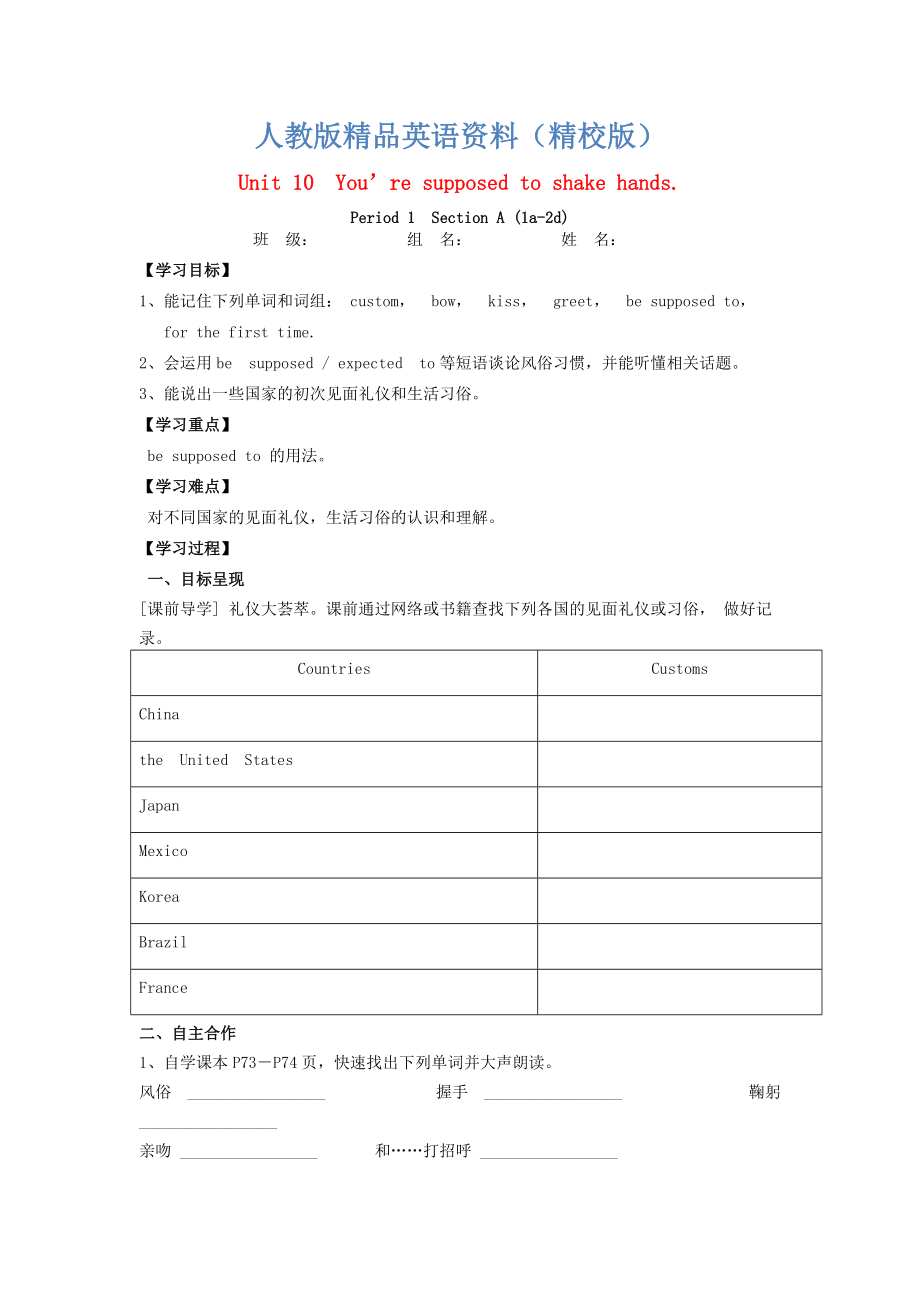《【精校版】九年級(jí)英語(yǔ)全冊(cè) Unit 10 You’re supposed to shake hands Period 1導(dǎo)學(xué)案人教新目標(biāo)版》由會(huì)員分享,可在線(xiàn)閱讀�,更多相關(guān)《【精校版】九年級(jí)英語(yǔ)全冊(cè) Unit 10 You’re supposed to shake hands Period 1導(dǎo)學(xué)案人教新目標(biāo)版(4頁(yè)珍藏版)》請(qǐng)?jiān)谘b配圖網(wǎng)上搜索。
1����、人教版精品英語(yǔ)資料(精校版)
Unit 10 You’re supposed to shake hands.
Period 1 Section A (1a-2d)
班 級(jí): 組 名: 姓 名:
【學(xué)習(xí)目標(biāo)】
1�����、 能記住下列單詞和詞組: custom, bow���, kiss��, greet, be supposed to�,
for the first time.
2���、會(huì)運(yùn)用be supposed / expected to等短語(yǔ)談?wù)擄L(fēng)俗習(xí)慣�����,并能聽(tīng)懂相關(guān)話(huà)題。
3�、能說(shuō)出一些國(guó)家的初次見(jiàn)面禮儀和生活習(xí)俗��。
2、【學(xué)習(xí)重點(diǎn)】
be supposed to 的用法�。
【學(xué)習(xí)難點(diǎn)】
對(duì)不同國(guó)家的見(jiàn)面禮儀�,生活習(xí)俗的認(rèn)識(shí)和理解�����。
【學(xué)習(xí)過(guò)程】
一、目標(biāo)呈現(xiàn)
[課前導(dǎo)學(xué)] 禮儀大薈萃����。課前通過(guò)網(wǎng)絡(luò)或書(shū)籍查找下列各國(guó)的見(jiàn)面禮儀或習(xí)俗�, 做好記錄�。
Countries
Customs
China
the United States
Japan
Mexico
Korea
Brazil
France
二�、自主合作
1����、自學(xué)課本P73-P74頁(yè),快速找出下列單詞并大聲朗讀����。
風(fēng)俗 _________________ 握手 ______
3��、___________ 鞠躬 _________________
親吻 _________________ 和……打招呼 _________________
2��、記憶大比拼?���?凑l(shuí)記得又快又準(zhǔn)。
三�、展示質(zhì)疑
1.??for?the?first?time? 第一次�����,首次
如:當(dāng)我第一次看到他時(shí),他正在看書(shū).____________________________________________ .
拓展:?1)?第二次?_________________________
學(xué)過(guò)的含time的短語(yǔ) ____________________
4、______________________________________________________.
2.??shake?的用法:
? 過(guò)去式______________? 過(guò)去分詞______________?? 現(xiàn)在分詞_______________
? 握手___________________"和某人握手" 可表示為shake hands with sb. 或shake one's hands???或 shake sb. by the hands
??? 他和我握手了.? ________________________________________
3. bo
5�、w 的用法
? 向某人鞠躬/低頭 可表示為:? bow to sb.???
? 不要向失敗(failure)低頭_________________________________________
4. 難點(diǎn)釋疑
(1)be supposed to do sth. 中的to是動(dòng)詞不定式符號(hào)����,其后要跟動(dòng)詞原形�,be有人稱(chēng)和時(shí)態(tài)的變化�。
? be supposed to 的主語(yǔ)是“人”時(shí)��,意為“應(yīng)該……����,被期望……”��,可用來(lái)表勸告���、建議��、義務(wù)或責(zé)任等����,相當(dāng)于情態(tài)動(dòng)詞should��。如:
You are supposed to ask the teacher if you wan
6、t to leave the classroom. 如果你想要離開(kāi)教室�,你應(yīng)該先問(wèn)問(wèn)老師�����。
? be supposed to的主語(yǔ)是“物”時(shí)���,意為“本應(yīng)����,本該”,用于表示某事本應(yīng)該發(fā)生而沒(méi)有發(fā)生�����。如:
The meeting is supposed to take place on Tuesday,but we have to put it off. 這個(gè)會(huì)議本應(yīng)該在星期二舉行���,但我們不得不把它推遲了。
? be supposed to的否定結(jié)構(gòu)為be not supposed to,常用于口語(yǔ)中����,意為“不被許可……����,不應(yīng)當(dāng)……”�。如:
You are not sup
7�����、posed to do that. 你不應(yīng)當(dāng)做那種事情。
(2)be supposed to 與should的用法區(qū)別
be supposed to do sth.:be supposed是suppose一詞的__________語(yǔ)態(tài)結(jié)構(gòu)��。后接動(dòng)詞不定式時(shí)���,含義相當(dāng)于should后接動(dòng)詞__________�����,并且should屬于__________語(yǔ)態(tài)形式,使用起來(lái)較嚴(yán)肅和正式��;而be supposed to do sth.的使用較隨便,建議性強(qiáng)。
5.課堂同步(仿寫(xiě)句子)
In Brazil,people are supposed to kiss when they meet so
8���、meone for the first time.
In the United States,_______________________________when they meet someone for the first time.
In Japan,_______________________________when they meet someone for the first time.
In Korea,______________________________________________________________.
In Mexico,_________
9�����、_____________________________________________________.
[聽(tīng)力導(dǎo)學(xué)]
1. 1b 認(rèn)真聽(tīng)錄音����,根據(jù)聽(tīng)到錄音內(nèi)容檢查自己在1a的答案。
2. 2a 先看懂右邊的插圖和左邊的句子�,再仔細(xì)聽(tīng)錄音內(nèi)容����,判斷瑪麗婭做錯(cuò)了什么。
3. 2b 先看懂對(duì)話(huà)的大體內(nèi)容�,猜一猜空格要填的內(nèi)容���,再聽(tīng)錄音完成空格�。
[對(duì)話(huà)練習(xí)]
1.小組合作。根據(jù)所學(xué)知識(shí)把不同國(guó)家第一次見(jiàn)面禮儀列出來(lái)����,并仿照1c進(jìn)行對(duì)話(huà)練習(xí)�。
2. 角色扮演�。根據(jù)2a, 2b的信息����,小組合作完成2c的對(duì)話(huà)訓(xùn)練���。
[學(xué)習(xí)小結(jié)]
如何談?wù)搼?yīng)該或不應(yīng)該做某事 ____
10、_____________________________________________________________________ _________________________________________________________________________
四�、鞏固構(gòu)建
一、 根據(jù)句意��,從方框中選擇恰當(dāng)?shù)膯卧~填空�����,有的需要變換形式。
kiss, custom, bow, greet, expect
1. Japanese people ____________ to each other eve
11��、ry time they meet.
2. In Britain, family members and good friends ____________ when they meet.
3. The girl usually ____________ people with a big smile.
4. Danny is ____________ to practice English every morning.
5. Mario and his father have trouble with Chinese ____________ and culture.
二����、 根據(jù)
12���、漢語(yǔ)意思完成英語(yǔ)句子�����,每空詞數(shù)不限。
1. 約翰尼第一次參觀(guān)動(dòng)物園����。
Johnny is visiting the zoo _____________________.
2. 沒(méi)有人喜歡每天做同樣的事情����。
No one likes _____________________ every day.
3. 比爾一聽(tīng)到那個(gè)消息就離開(kāi)了�����。
Bill left _____________________ he heard the news.
4. 令我們驚訝的是�����,貝姬是我們經(jīng)理的女兒���。
_____________________, Becky is our manager’s daug
13�、hter.
5. 晚餐我們應(yīng)該8點(diǎn)到����,但是我們遲到了。
We _____________________ arrive for dinner at eight, but we were late.
6. 這條街道的兩旁有很多高樓��。
There’re a lot of tall buildings _____________________ this street.
三��、根據(jù)句意��,用括號(hào)中所給單詞或首字母完成句子。
?1. You are supposed ________________(shake) here.?
?2.? You must know some ________
14�、__(custom) before you go to some foreign countries.
?3.? The drink should? _____________(shake) before you drink it. '
?4.? It's not polite ____________(kiss) the others in public in China.
?5.? I was s_________ to arrive at 8:00, but I arrived at 9:00
?6.? The teacher gave me some a________on how to learn English.
 【精校版】九年級(jí)英語(yǔ)全冊(cè) Unit 10 You’re supposed to shake hands Period 1導(dǎo)學(xué)案人教新目標(biāo)版
【精校版】九年級(jí)英語(yǔ)全冊(cè) Unit 10 You’re supposed to shake hands Period 1導(dǎo)學(xué)案人教新目標(biāo)版

